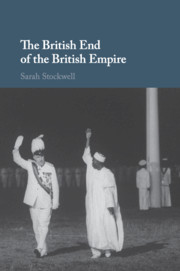Book contents
- The British End of the British Empire
- The British End of the British Empire
- Copyright page
- Dedication
- Contents
- Figures
- Tables
- Acknowledgements
- Abbreviations and Note on the Text
- Introduction
- 1 The Imperial Roles of British Institutions
- 2 Technical Assistance and State-building at the End of Empire
- 3 Teaching What ‘the Natives Need to Know’: The Universities of Oxford and Cambridge and Training for Overseas Public Administration
- 4 ‘Education and Propaganda’: The Bank of England and the Development of Central Banking in African States at the End of Empire
- 5 Making Money: The Royal Mint and British Decolonization
- 6 ‘Losing an Empire and Winning Friends’: Sandhurst and British Decolonization
- Conclusion
- Bibliography
- Index
- References
Bibliography
Published online by Cambridge University Press: 10 August 2018
- The British End of the British Empire
- The British End of the British Empire
- Copyright page
- Dedication
- Contents
- Figures
- Tables
- Acknowledgements
- Abbreviations and Note on the Text
- Introduction
- 1 The Imperial Roles of British Institutions
- 2 Technical Assistance and State-building at the End of Empire
- 3 Teaching What ‘the Natives Need to Know’: The Universities of Oxford and Cambridge and Training for Overseas Public Administration
- 4 ‘Education and Propaganda’: The Bank of England and the Development of Central Banking in African States at the End of Empire
- 5 Making Money: The Royal Mint and British Decolonization
- 6 ‘Losing an Empire and Winning Friends’: Sandhurst and British Decolonization
- Conclusion
- Bibliography
- Index
- References
- Type
- Chapter
- Information
- The British End of the British Empire , pp. 299 - 322Publisher: Cambridge University PressPrint publication year: 2018



